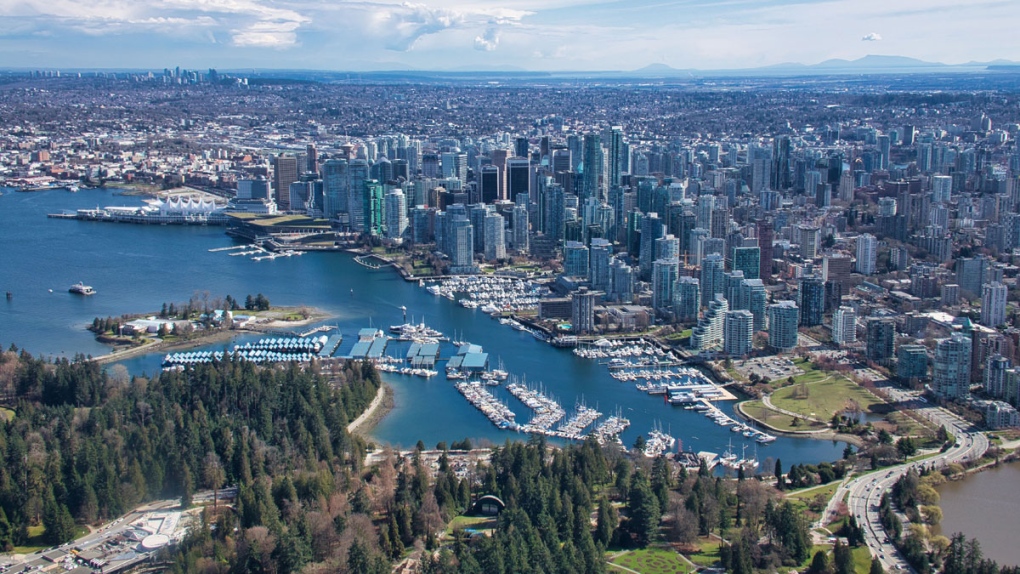Here's how much you need to earn to afford to live in Vancouver, compared to in other parts of B.C.
 Vancouver's skyline is seen in an image from CTV News Vancouver's Pete Cline captured in May 2019 from Chopper 9
Vancouver's skyline is seen in an image from CTV News Vancouver's Pete Cline captured in May 2019 from Chopper 9
New data released by the Canadian Centre for Policy Alternatives highlights just how much more money people need to live in Metro Vancouver than in previous years.
According to the data released Tuesday, the living wage for Metro Vancouver is $20.52, which is more than $5 higher than B.C.'s minimum wage and $1.02 higher than the previous calculation, which was done in 2019.
The living wage is calculated as the hourly amount a person should make to meet basic expenses including rent, child care, food and transportation. It also takes income supports and accessible public services into account.
"The reality is that a number of families across B.C. earn less than a living wage and struggle to make ends meet with the rising cost of living, especially the cost of housing," said Anastasia French, Living Wage for Families B.C. organizer, in a news release.
The CCPA said the most significant cost increases were from housing, which rose 8.6 per cent, and telecommunications, which rose six per cent.
While a pandemic-related rent freeze prevented housing rates from rising even higher, the organization said the median monthly rent for a three-bedroom unit in Metro Vancouver rose by $147 in October 2020.
The CCPA does credit provincial investments in child care for keeping the living wage from going up even more.
"This year’s calculation shows the impact of public policy changes since 2018, notably significant child care investments, the new B.C. Child Opportunity Benefit and elimination of MSP premiums, as well as other small changes to government transfers and taxes," French said.
"These changes have helped offset the increase in family expenses since 2018, improving affordability for modest- and middle-income families with young children, which demonstrates the power of good public policy to make life more affordable for families."
A living-wage calculation wasn't made in 2020 because of unprecedented changes and disruptions due to the COVID-19 pandemic. Here are the living wages calculated for other parts of the province:
- Fraser Valley: $16.75, up from $15.54 in 2019
- Greater Victoria: $20.46, up from $19.39 in 2019
- Kamloops: $16.71, up from $15.93 in 2019
- Kelowna: $18.49, data not collected in 2019
CTVNews.ca Top Stories

Calgary woman stranded in Mexico after husband's death during diving trip
A Calgary woman is struggling to return home after her husband died while diving in Mexico, leaving her stranded and facing financial hardship.
'Inadmissible' foreign nationals to pay more upon return to Canada: CBSA
Foreign nationals who refuse or are unable to pay their own way home after being denied stay in Canada will soon face steeper financial penalties should they ever attempt to return.
Sea and Himalayan salts recalled in Canada: 'Do not use, serve or distribute'
Two brands of sea and Himalayan salt are being recalled in Canada due to pieces of plastic found in the products.
Liberal caucus chairs meet to talk Trudeau, PM attends Canada-U.S. cabinet committee
Prime Minister Justin Trudeau was back in Ottawa today, but having yet to signal he's ready to address the snowballing resignation calls, the Liberal caucus' regional chairs called a meeting today to discuss next steps.
N.S. community shocked by deaths of father, daughter; suspect was wanted in Toronto shooting
A Nova Scotia community is mourning the loss of two of its members after they were shot and killed in Halifax on New Year’s Eve.
Judge sets Trump's sentencing in hush money case for Jan. 10, but signals no jail time
In an extraordinary turn, a judge Friday set U.S. president-elect Donald Trump's sentencing in his hush money case for Jan. 10, but indicated he wouldn't be jailed.
'Mystery volcano' that erupted and cooled Earth in 1831 has finally been identified
An unknown volcano erupted so explosively in 1831 that it cooled Earth's climate. Now, nearly 200 years later, scientists have identified the 'mystery volcano.'
When do I receive federal benefits this year? Payment dates for 2025
From the Canada Child Benefit to Old Age Security, federal payment dates have been determined for 2025. Find out when you can expect your payments.
Ontario aiming to send out $200 rebate cheques later this month or early February
Ontarians should receive their $200 rebate cheque from the province by the end of January or early February, a government spokesperson confirmed in an email Friday.































